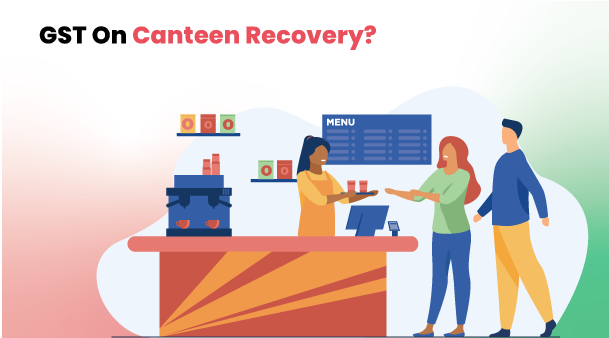
A canteen facility is provided by many organizations in order to improve productivity and also as a measure of Human Resources initiative. The running of a subsidized canteen is mandated by the Factories Act, 1948 only in respect of factories and not for all commercial establishments. Most IT companies do not come under the definition of a factory. The amount of subsidy to be provided has not been defined under the Factories Act and accordingly, the companies are taking different positions for extending the benefit to their employees. Some of these models are as under:
- – Preparing the food in the house and serving it to the employees at a cost, subsidized or otherwise
- – Getting the food from outside and serving it to the employees at a cost, subsidized or otherwise
- – Getting the food from an outside contractor, who does the service inside the company
- – Engaging the contractor in the factory, who uses the facilities in order to prepare the food and serve it to the employees
In all these cases, there are many incidental expenses like transportation, manpower supply, cleaning services, cooking services, cost of materials used in the preparation of food like milk, condiments, rice, atta etc., cost of cutlery, cost of machinery like cookers, atta kneaders, roti makers etc., consumable like steam, water, etc. So the question is whether input credit is eligible on all such expenses and is there any output tax liability when there is a consideration collected from such employees.
In GST law, as per the proviso under Section 17(5)(iii) of CGST Act, 2017 wherein it states that “Provided that the input tax credit in respect of such goods or services or both shall be available, where it is obligatory for an employer to provide the same to its employees under any law for the time being in force”.
Hence when a canteen is obligated under the factories act, the credit in relation to such expenses needs to be available to the assessee. But unfortunately, the authorities are viewing that consumption of the canteen food is not in relation to the business on hand for the assessee and also that the employee is consuming the food in his individual capacity and thereby is not contributing to the business. Irrational it may sound, but the input credit denial is being confirmed by the AAR, AAAR, and HCs, and also by the Supreme Court of this country.
Recently in the matter of Toyota Kirloskar Motors Private Limited Special Leave to Appeal Nos.17903-17904/2021 ft. 18.11.2021 arising out of the Karnataka High Court decision in CEA No.36/2018 dt.21.04.2021, the SC has opined that “The statutory provision – Rule 2(1) defining “Input Service” post 01.04.2011 is very clear and the out-door catering services when such services are used primarily for personal use or consumption of any employee is held to be excluded from the definition of “Input Service”. Though the decision is given in the context of erstwhile service tax law, the spirit of the decision is being maintained in the GST also by the authorities.
In view of the prevailing confusion, the best course for the industry is to make a commercial decision on the way forward considering the options available to them. For arriving at such a decision, let us illustrate the tax liability as under:
- If the company is not a factory as per the Factories act, then there is no obligation for them to run the canteen. As per their HR policy, if they have a canteen, then it will be subject to tax. Now the issue would be if the canteen is run by the company and no recovery is made from the employees then the company cannot avail ITC on the inputs and input services in relation to the canteen services as they do not have any output tax liability in the absence of consideration. However the authorities may cite Schedule I and due to the relationship between employee and employer, they may insist on the output tax on the market value of the food being offered. This will lead to litigation. Hence if the employment agreements are structured in such a way that there is a mention of such services being given to the employee, the company can defend its position and can avail ITC on the canteen service provider’s invoice which can be used to offset while paying output tax on the market value of the food provided.
- If the company is not a factory as per the Factories Act and they are running a canteen with the help of an outdoor caterer, then the outdoor caterer would be billing the company for the services provided by him and the company cannot avail ITC in case they are not recovering any amounts from their employees. If the company is making any recovery from the employee either in full or on a subsidized basis, then they can avail ITC as the input service is resulting in a taxable output service in their hands. But they need to pay the output tax at the full rate on par with the input supply from the caterer but not on the subsidized amount collected from their employee as employer and employee are held as related parties under GST Law and price cannot be the sole consideration for tax. Here also there can be an issue when the outdoor caterer bills the company, he may charge only 5% subsidized rate as he is foregoing his ITC but the company needs to pay 18% as they will not be eligible for the subsidized rate as per the view of the authorities in the field currently.
- If the company is a factory, then there is an obligation for them to run the subsidized canteen. There can be recovery from the employees of a subsidized amount towards the cost of food. In such a scenario, if the company is rendering the services on their own, they may not be able to avail the ITC on canteen procurements as the authorities may say that the same are not in relation to their business, but the factory can always take the stand that when output is taxed in their hands, then relevant input should be allowed. Considering that the same is allowed, then the factory cannot pay the output tax on the subsidized amount collected from the employee as he being a related party. They need to ascertain the market value of the food being served in the canteen or need to adopt the cost as per the cost auditor report at their end and to discharge the tax at 18% rate only as subsidized rate is applicable only when the condition of not availing the ITC is fulfilled. A view is prevailing in the market, that in relation to such canteen services, if no ITC is availed by the factory, then whether 5% subsidized rate is supportable requires to be tested with judicial forums. As on date, no case law is available on this subject in public domain.
- If the factory happens to be SEZ, then the problem gets compounded. The SEZ authorities are not agreeing to accept the canteen supplies for authorized operations. Hence the factories in SEZ are not in a position to return the endorsed copies of invoices to their vendors in order to get tax free supply of canteen consumables. Only initial setting up of canteen in a non-production area is permitted tax free in an SEZ, but the running of canteen in a non-production area is not authorized operation in SEZ. Hence the view of the authorities appears to be correct, but when the subsidized canteen is obligated under Factories Act, they need to permit the canteen supplies also treating them to be for authorized operations. The Ministry of Commerce is to issue necessary clarifications in this regard. But they cite that the Ministry of Finance has to concur with them. Ministry of Finance will cite that GST Council has to agree on this point as it is in relation to the GST. Hence we cannot expect an early resolution.
- If the factory happens to be SEZ and they have engaged an outdoor caterer to run the canteen. In such a scenario, the outdoor catering services is recognized as for authorized operations and hence the outdoor caterer may not charge the SEZ factory. But when SEZ factory is collecting the subsidized amount for canteen from their employees, they will have to charge 18% on the market value of the food being served keeping in mind the relation attributed by GST between employer and employee, but cannot charge 5% subsidized rate as they cannot forego the ITC in their hands for the operations.
- Whether the stand of pure agent will help the assessee is something needs to be explored. In relation to the canteen services, the assessee will take a stand that he is facilitating such service to the employees from the outdoor caterer and incidentally paying a portion of the consideration from his end though it is not resulting in any service to him and the balance is collected from employee in the form of the subsidized amount and is paid to the outdoor caterer. But there are no settled case laws on these lines and this has to be tested at courts. However this stand cannot be applied if the assessee is rendering the canteen services on his own
Conclusion
Currently, in some states, the GST AAR/AAAR decisions are in favour of the assessee holding a view that there is no need to pay GST on the canteen recoveries, but still the issue is not free from litigation as these decisions are to be accepted during the audits by the GST authorities and CAG and also to be acceptable to the enforcement/investigation authorities under GST. If any of these agencies are not agreeing to such decisions, then the decision may protect only the party to the litigation but will not be of citational use for the other assessee in the same state. If there is clarity from the authorities that the canteen services atleast provided in a factory are obligatory and hence they are in relation to the business or for authorized operations of the assessee, then all other incidental expenses also will be creditable in the hands of the assesee and there is no need for output tax to be paid. Let us hope that good sense prevails and the authorities may come out with clarity on the issue at the earliest.

